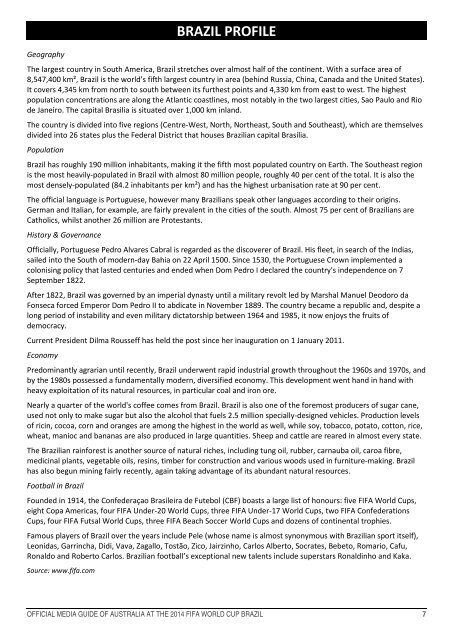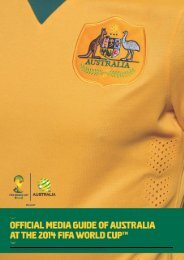OFFICIAL MEDIA GUIDE OF AUSTRALIA AT THE 2014 FIFA WORLD CUP BRAZIL 0
AFWC14MG
AFWC14MG
You also want an ePaper? Increase the reach of your titles
YUMPU automatically turns print PDFs into web optimized ePapers that Google loves.
Geography<br />
<strong>BRAZIL</strong> PR<strong>OF</strong>ILE<br />
The largest country in South America, Brazil stretches over almost half of the continent. With a surface area of<br />
8,547,400 km², Brazil is the world’s fifth largest country in area (behind Russia, China, Canada and the United States).<br />
It covers 4,345 km from north to south between its furthest points and 4,330 km from east to west. The highest<br />
population concentrations are along the Atlantic coastlines, most notably in the two largest cities, Sao Paulo and Rio<br />
de Janeiro. The capital Brasilia is situated over 1,000 km inland.<br />
The country is divided into five regions (Centre-West, North, Northeast, South and Southeast), which are themselves<br />
divided into 26 states plus the Federal District that houses Brazilian capital Brasília.<br />
Population<br />
Brazil has roughly 190 million inhabitants, making it the fifth most populated country on Earth. The Southeast region<br />
is the most heavily-populated in Brazil with almost 80 million people, roughly 40 per cent of the total. It is also the<br />
most densely-populated (84.2 inhabitants per km²) and has the highest urbanisation rate at 90 per cent.<br />
The official language is Portuguese, however many Brazilians speak other languages according to their origins.<br />
German and Italian, for example, are fairly prevalent in the cities of the south. Almost 75 per cent of Brazilians are<br />
Catholics, whilst another 26 million are Protestants.<br />
History & Governance<br />
Officially, Portuguese Pedro Alvares Cabral is regarded as the discoverer of Brazil. His fleet, in search of the Indias,<br />
sailed into the South of modern-day Bahia on 22 April 1500. Since 1530, the Portuguese Crown implemented a<br />
colonising policy that lasted centuries and ended when Dom Pedro I declared the country's independence on 7<br />
September 1822.<br />
After 1822, Brazil was governed by an imperial dynasty until a military revolt led by Marshal Manuel Deodoro da<br />
Fonseca forced Emperor Dom Pedro II to abdicate in November 1889. The country became a republic and, despite a<br />
long period of instability and even military dictatorship between 1964 and 1985, it now enjoys the fruits of<br />
democracy.<br />
Current President Dilma Rousseff has held the post since her inauguration on 1 January 2011.<br />
Economy<br />
Predominantly agrarian until recently, Brazil underwent rapid industrial growth throughout the 1960s and 1970s, and<br />
by the 1980s possessed a fundamentally modern, diversified economy. This development went hand in hand with<br />
heavy exploitation of its natural resources, in particular coal and iron ore.<br />
Nearly a quarter of the world's coffee comes from Brazil. Brazil is also one of the foremost producers of sugar cane,<br />
used not only to make sugar but also the alcohol that fuels 2.5 million specially-designed vehicles. Production levels<br />
of ricin, cocoa, corn and oranges are among the highest in the world as well, while soy, tobacco, potato, cotton, rice,<br />
wheat, manioc and bananas are also produced in large quantities. Sheep and cattle are reared in almost every state.<br />
The Brazilian rainforest is another source of natural riches, including tung oil, rubber, carnauba oil, caroa fibre,<br />
medicinal plants, vegetable oils, resins, timber for construction and various woods used in furniture-making. Brazil<br />
has also begun mining fairly recently, again taking advantage of its abundant natural resources.<br />
Football in Brazil<br />
Founded in 1914, the Confederaçao Brasileira de Futebol (CBF) boasts a large list of honours: five <strong>FIFA</strong> World Cups,<br />
eight Copa Americas, four <strong>FIFA</strong> Under-20 World Cups, three <strong>FIFA</strong> Under-17 World Cups, two <strong>FIFA</strong> Confederations<br />
Cups, four <strong>FIFA</strong> Futsal World Cups, three <strong>FIFA</strong> Beach Soccer World Cups and dozens of continental trophies.<br />
Famous players of Brazil over the years include Pele (whose name is almost synonymous with Brazilian sport itself),<br />
Leonidas, Garrincha, Didi, Vava, Zagallo, Tostão, Zico, Jairzinho, Carlos Alberto, Socrates, Bebeto, Romario, Cafu,<br />
Ronaldo and Roberto Carlos. Brazilian football’s exceptional new talents include superstars Ronaldinho and Kaka.<br />
Source: www.fifa.com<br />
<strong><strong>OF</strong>FICIAL</strong> <strong>MEDIA</strong> <strong>GUIDE</strong> <strong>OF</strong> <strong>AUSTRALIA</strong> <strong>AT</strong> <strong>THE</strong> <strong>2014</strong> <strong>FIFA</strong> <strong>WORLD</strong> <strong>CUP</strong> <strong>BRAZIL</strong> 7





